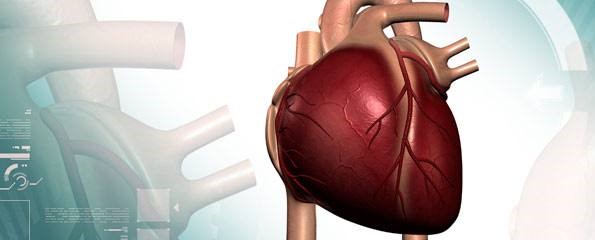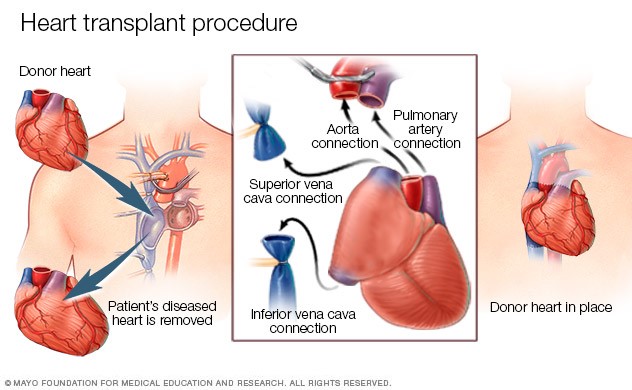Heart Transplant
Heart Transplant
Heart transplantation is a life-saving treatment option for a person suffering from various end-stage heart diseases. Organ transplantation is performed for patients who have received all other medical therapies, device treatment and surgical intervention options yet, have not recovered. In such cases, heart transplantation is the last resort recommended by doctors.

Heart transplantation is a relatively simple operation for a cardiac surgeon. In fact, the procedure actually consists of three operations.
The first operation is harvesting the heart from the donor. The donor is usually an unfortunate person who has suffered irreversible brain injury, called “brain death”. Very often these are patients who have had major trauma to the head, for example, in an automobile accident. The victim’s organs, other than the brain, are working well with the help of medications and other “life support” that may include a respirator or other devices. A team of physicians, nurses, and technicians goes to the hospital of the donor to remove donated organs once brain death of the donor has been determined. The removed organs are transported on ice to keep them alive until they can be implanted. For the heart, this is optimally less than six hours. So, the organs are often flown by airplane or helicopter to the recipient’s hospital.
The second operation is removing the recipient’s damaged heart. Removing the damaged heart may be very easy or very difficult, depending on whether the recipient has had previous heart surgery (as is often the case). If there has been previous surgery, cutting through the scar tissue may prolong and complicate removal of the heart.
The third operation is probably the easiest; the implantation of the donor heart. Today, this operation basically involves the creation of only five lines of stitches, or “anastomoses”. These suture lines connect the large blood vessels entering and leaving the heart. Remarkably, if there are no complications, most patients who have had a heart transplant are home about one week after the surgery. The generosity of donors and their families makes organ transplant possible.

Who needs a Heart Transplant?
There are not enough donor hearts available for everyone who may need a hear transplant. Therefore, there is a careful selection process in place to assure that hearts are distributed fairly and to those who will benefit most from the donor heart. The heart is just a pump, although a complicated pump. Most patients require a transplant because their hearts can no longer pump well enough to supply blood with oxygen and nutrients to the organs of the body. A smaller number of patients have a good pump, but a bad “electrical conduction system” of the heart. This electrical system determines the rate, rhythm and sequence of contraction of the heart muscle. There are all kinds of problems that can occur with the conduction system, including complete interruption of cardiac function causing sudden cardiac death.
While there are many people with “end-stage” heart disease with inadequate function of the heart, not all qualify for a heart transplant. All the other important organs in the body must be in pretty good shape. Transplants cannot be performed in patients with active infection, cancer, or bad diabetes mellitus; patients who smoke or abuse alcohol are also not good candidates. It’s not easy to be a transplant recipient. These patients need to change their lifestyle and take numerous medications (commonly more than 30 different medications). Hence, all potential transplants patients must undergo psychological testing to identify social and behavioural factors that could interfere with recovery, compliance with medications, and lifestyle changes required after transplantation.
Moreover, needing a heart and being a suitable candidate are not enough. The potential donor heart must be compatible with the recipient’s immune system to decrease the chance of problems with rejection. Finally, this precious resource, the donor organ, must be distributed fairly. The United Network for Organ Sharing (UNOS) is in charge of a system that is in place to assure equitable allocation of organs to individuals who will benefit the most from transplantation. These are usually the sickest patients.

Aarav Medicare team is ready to look after all your medical emergency needs. We will Take care of your health.
Saurav
Why Aarav Medicare?

Highly Qualified Specialists
Best Specialist Doctors for all the Treatment and Procedures. Get Free Online Consutations.

State Of The Art Facility
Finest Hospitals with all the modern Medical Equipment and Best Patient Care.
